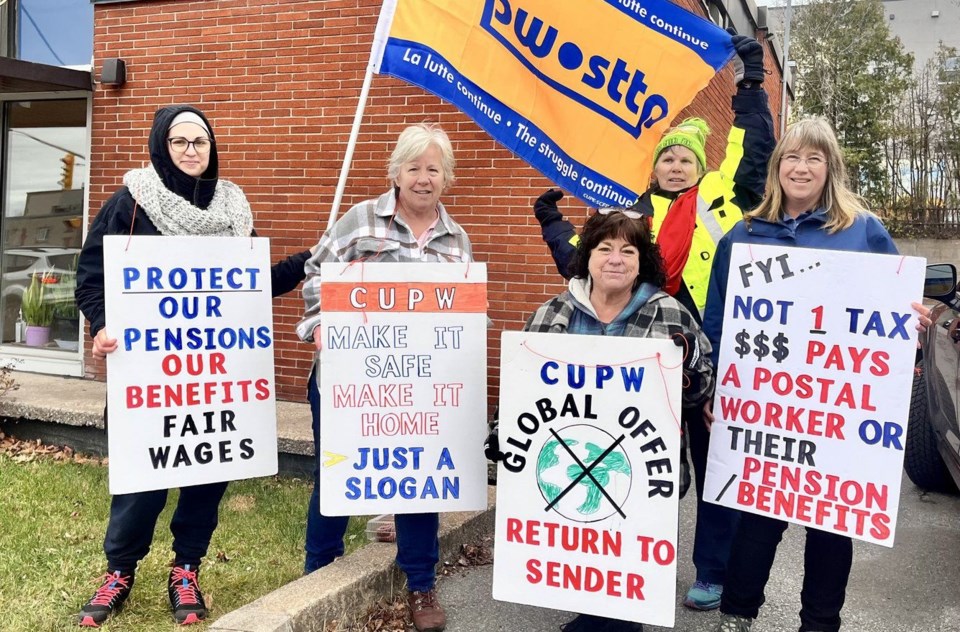The national Canada Post strike is halting mail and parcel deliveries across the country, but for many workers, the disruption underscores deeper issues around wages, benefits, and working conditions.
“We don't like this any more than our customers do," said Mary Jackson, who is the spokesperson for the Muskoka Local 506.
The Canadian Union of Postal Workers (CUPW) is demanding a 24 per cent wage increase over four years, improved sick leave, and the elimination of the “separate sort from delivery” (SSD) system, which divides sorting tasks from delivery roles.
The union argues this model leads to health and safety risks for letter carriers, who now spend entire shifts outdoors.
Canada Post counters that financial pressures make these demands challenging. The Crown Corporation reported a $490 million loss in the first half of 2024 and a 28 per cent drop in parcel volumes since CUPW announced its strike mandate in late October.
It was announced today that negotiations have broken down between Canada Post and CUPW for the first time since the countrywide strike began. "Canada Post is considering its options to move negotiations forward as talks with the Canadian Union of Postal Workers have ground to a halt on key issues critical to the Corporation's future," says the Corporation's website.
Jackson said Canada Post employees are facing increasingly difficult working conditions and financial instability, which is compounded by corporate decisions that prioritize profits over workers' well-being.
“We want to be back to work, making a paycheque. Christmas is coming. We recognize the situation with the public. But keep in mind, we are the public too,” Jackson said.
In Huntsville, retired postal worker Bev Belanger sees the strike not only as a fight for fair wages and better working conditions but also as a reflection of long-standing inequities between urban and rural carriers.
Belanger, who retired in 2015 after 37 years with Canada Post in Mississauga, moved to Huntsville and connected with the local postal community. Though she never worked there, she remains supportive of Huntsville’s rural and suburban mail carriers (RSMCs), even bringing picketers cinnamon buns.
Belanger recalls going on strike six times during her career, including a pivotal strike for paid maternity leave when she was 22.
“Canada Post was the first company to get paid maternity benefits,” she said. “It was nice to see the men go on strike for that, too. Because it’s a family issue, not just a women’s issue.”
Despite progress over the years, Belanger highlighted divisions among postal workers, saying Huntsville’s postal workers, primarily RSMCs, face challenges compared to their urban counterparts.
“The people who work out of Huntsville don’t have the benefits or the pension that I got because I worked in the city,” said Belanger. “They’ve split worker against worker, and unfortunately, that hurts everybody.”
She also raised concerns about working conditions.
“Some customers are surprised that carriers are coming and bringing their mail at 7 or 8 at night when it’s dark. Safety was not paramount in their eyes at all,” Belanger said.
What’s next?
As negotiations continue under the guidance of a federal mediator, Belanger and Jackson hope for a resolution that addresses the concerns of all postal workers.
Until then, Huntsville residents, like the rest of the country, will have to wait for their mail — and for an agreement that balances the needs of workers and the corporation.
Canada Post negotiation updates are shared on its website.
Megan Hederson is a Local Journalism Initiative reporter covering Huntsville and Lake of Bays for MuskokaRegion.com. The Local Journalism Initiative is funded by the Government of Canada.
The special federal mediator has decided to temporarily suspend mediation between Canada Post and CUPW. After several intensive days of negotiation, his assessment is that parties remain too far apart on critical issues for mediation to be successful at this time.
— Steven MacKinnon (@stevenmackinnon) November 27, 2024
This pause in…



